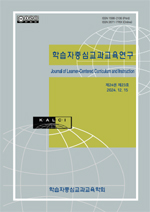대학생 대상 진로집단상담 프로그램 개발을 위한 4MAT 학습유형 및 Holland 진로유형 분석
Analysis of 4MAT Learning Types and Holland Career Types for the Development of Career Group Counseling Programs for University Students
- 학습자중심교과교육학회
- 학습자중심교과교육연구
- 제24권 23호
-
2024.12714 - 729 (16 pages)
-
DOI : 10.22251/jlcci.2024.24.23.714
- 184

목적 본 연구에서는 대학생을 대상으로 효과적인 진로집단상담 개발을 위해 4MAT이론을 활용한 학습유형과 Holland이론을 활용한 직업적성검사 결과를 분석하여 대학생에 적합한 진로집단상담 프로그램 개발의 기초를 마련하고자 한다. 방법 이를 위하여 2019년부터 2021년까지 3년 동안 경상도 소재 대학 신입생 3,306명을 대상으로 4MAT이론 기반 학습유형 검사인 LTM(Learning Type Measure)과 Holland 직업적성검사를 활용하여 학생들의 진로유형을 분석하였다. 수집된 자료는 SPSS 21을 이용하여 분석하였다. 결과 4MAT 학습유형 중 학습사고유형은 1유형이 1,137명(34.4%)으로 가장 많았으며, 4MAT 학습유형 중 학습행동유형은 행동형이 1,915명(57.9%)으로 관찰형 1,391명(42.1%)보다 높게 나타났지만, 행동형은 매년 비율이 감소(2019년 63.9%, 2020년 46.5%, 2021년 43.2%)하고, 관찰형은 증가(2019년 36.1%, 2020년 53.5%, 2021년 56.8%)하였다 .Holland 진로유형은 사회형(Social Type)이 1,279명(38.7%)으로 가장 높게 나타났으며, 그 뒤로 예술형(Artistic Type) 975명(29.5%)으로 나타났다. 결론 대학생 대상 진로집단상담 프로그램을 개발⋅운영할 때, 관계중심의 특성을 반영한 협동학습의 요소와 4MAT 활용 진로상담모형을 적용한 프로그램 회기 구성 그리고 Holland 진로유형의 특성을 반영한 프로그램 모듈을 개발한다면, 대학에서 운영하는 진로집단상담 프로그램의 효과성 및 신뢰도 그리고 질적 수준의 향상을 기대한다.
Objectives This study aims to establish the foundation for developing effective career group counseling programs for university students by analyzing learning types based on the 4MAT theory and vocational aptitude test results utilizing the Holland theory. Methods To achieve this, from 2019 to 2021, a total of 3,306 freshmen from a university in Gyeongsang province were assessed using the Learning Type Measure (LTM), which is based on the 4MAT theory, and Holland’s vocational aptitude test to analyze their career types. The collected data were analyzed using SPSS 21. Results Among the 4MAT learning types, the first type of learning thinking style had the highest proportion with 1,137 students (34.4%). In terms of the learning behavior types, the acting type accounted for 1,915 students (57.9%), which was higher than the observing type with 1,391 students (42.1%). However, the proportion of the acting type decreased each year (63.9% in 2019, 46.5% in 2020, 43.2% in 2021), while the observing type increased (36.1% in 2019, 53.5% in 2020, 56.8% in 2021). Regarding the Holland career types, the social type was the most prominent with 1,279 students (38.7%), followed by the artistic type with 975 students (29.5%). Conclusions When developing and implementing career group counseling programs for university students, incorporating elements of cooperative learning that reflect relationship-centered characteristics, designing program sessions using the 4MAT-based career counseling model, and developing program modules that reflect the characteristics of Holland's career types could enhance the effectiveness, reliability, and quality of university-run career group counseling programs.
Ⅰ. 서론
Ⅱ. 연구 방법
Ⅲ. 연구 결과
Ⅳ. 결론 및 논의
참고문헌
(0)
(0)